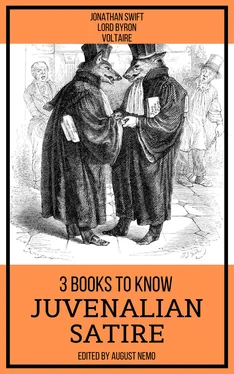Or eats from out the palm, or playful lowers
His brow, as if in act to butt, and then
Yielding to their small hands, draws back again.
Their classical profiles, and glittering dresses,
Their large black eyes, and soft seraphic cheeks,
Crimson as cleft pomegranates, their long tresses,
The gesture which enchants, the eye that speaks,
The innocence which happy childhood blesses,
Made quite a picture of these little Greeks;
So that the philosophical beholder
Sigh'd for their sakes—that they should e'er grow older.
Afar, a dwarf buffoon stood telling tales
To a sedate grey circle of old smokers,
Of secret treasures found in hidden vales,
Of wonderful replies from Arab jokers,
Of charms to make good gold and cure bad ails,
Of rocks bewitch'd that open to the knockers,
Of magic ladies who, by one sole act,
Transform'd their lords to beasts (but that 's a fact).
Here was no lack of innocent diversion
For the imagination or the senses,
Song, dance, wine, music, stories from the Persian,
All pretty pastimes in which no offence is;
But Lambro saw all these things with aversion,
Perceiving in his absence such expenses,
Dreading that climax of all human ills,
The inflammation of his weekly bills.
Ah! what is man? what perils still environ
The happiest mortals even after dinner—
A day of gold from out an age of iron
Is all that life allows the luckiest sinner;
Pleasure (whene'er she sings, at least) 's a siren,
That lures, to flay alive, the young beginner;
Lambro's reception at his people's banquet
Was such as fire accords to a wet blanket.
He—being a man who seldom used a word
Too much, and wishing gladly to surprise
(In general he surprised men with the sword)
His daughter—had not sent before to advise
Of his arrival, so that no one stirr'd;
And long he paused to re-assure his eyes
In fact much more astonish'd than delighted,
To find so much good company invited.
He did not know (alas! how men will lie)
That a report (especially the Greeks)
Avouch'd his death (such people never die),
And put his house in mourning several weeks,—
But now their eyes and also lips were dry;
The bloom, too, had return'd to Haidee's cheeks,
Her tears, too, being return'd into their fount,
She now kept house upon her own account.
Hence all this rice, meat, dancing, wine, and fiddling,
Which turn'd the isle into a place of pleasure;
The servants all were getting drunk or idling,
A life which made them happy beyond measure.
Her father's hospitality seem'd middling,
Compared with what Haidee did with his treasure;
'T was wonderful how things went on improving,
While she had not one hour to spare from loving.
Perhaps you think in stumbling on this feast
He flew into a passion, and in fact
There was no mighty reason to be pleased;
Perhaps you prophesy some sudden act,
The whip, the rack, or dungeon at the least,
To teach his people to be more exact,
And that, proceeding at a very high rate,
He show'd the royal penchants of a pirate.
You 're wrong.—He was the mildest manner'd man
That ever scuttled ship or cut a throat:
With such true breeding of a gentleman,
You never could divine his real thought;
No courtier could, and scarcely woman can
Gird more deceit within a petticoat;
Pity he loved adventurous life's variety,
He was so great a loss to good society.
Advancing to the nearest dinner tray,
Tapping the shoulder of the nighest guest,
With a peculiar smile, which, by the way,
Boded no good, whatever it express'd,
He ask'd the meaning of this holiday;
The vinous Greek to whom he had address'd
His question, much too merry to divine
The questioner, fill'd up a glass of wine,
And without turning his facetious head,
Over his shoulder, with a Bacchant air,
Presented the o'erflowing cup, and said,
'Talking 's dry work, I have no time to spare.'
A second hiccup'd, 'Our old master 's dead,
You 'd better ask our mistress who 's his heir.'
'Our mistress!' quoth a third: 'Our mistress!—pooh!-
You mean our master—not the old, but new.'
These rascals, being new comers, knew not whom
They thus address'd—and Lambro's visage fell—
And o'er his eye a momentary gloom
Pass'd, but he strove quite courteously to quell
The expression, and endeavouring to resume
His smile, requested one of them to tell
The name and quality of his new patron,
Who seem'd to have turn'd Haidee into a matron.
'I know not,' quoth the fellow, 'who or what
He is, nor whence he came—and little care;
But this I know, that this roast capon 's fat,
And that good wine ne'er wash'd down better fare;
And if you are not satisfied with that,
Direct your questions to my neighbour there;
He 'll answer all for better or for worse,
For none likes more to hear himself converse.'
I said that Lambro was a man of patience,
And certainly he show'd the best of breeding,
Which scarce even France, the paragon of nations,
E'er saw her most polite of sons exceeding;
He bore these sneers against his near relations,
His own anxiety, his heart, too, bleeding,
The insults, too, of every servile glutton,
Who all the time was eating up his mutton.
Now in a person used to much command—
To bid men come, and go, and come again—
To see his orders done, too, out of hand—
Whether the word was death, or but the chain—
It may seem strange to find his manners bland;
Yet such things are, which I can not explain,
Though doubtless he who can command himself
Is good to govern—almost as a Guelf.
Not that he was not sometimes rash or so,
But never in his real and serious mood;
Then calm, concentrated, and still, and slow,
He lay coil'd like the boa in the wood;
With him it never was a word and blow,
His angry word once o'er, he shed no blood,
But in his silence there was much to rue,
And his one blow left little work for two.
He ask'd no further questions, and proceeded
On to the house, but by a private way,
So that the few who met him hardly heeded,
So little they expected him that day;
If love paternal in his bosom pleaded
For Haidee's sake, is more than I can say,
But certainly to one deem'd dead, returning,
This revel seem'd a curious mode of mourning.
If all the dead could now return to life
(Which God forbid!) or some, or a great many,
For instance, if a husband or his wife
(Nuptial examples are as good as any),
No doubt whate'er might be their former strife,
The present weather would be much more rainy—
Tears shed into the grave of the connection
Would share most probably its resurrection.
He enter'd in the house no more his home,
A thing to human feelings the most trying,
And harder for the heart to overcome,
Perhaps, than even the mental pangs of dying;
To find our hearthstone turn'd into a tomb,
And round its once warm precincts palely lying
The ashes of our hopes, is a deep grief,
Beyond a single gentleman's belief.
He enter'd in the house—his home no more,
For without hearts there is no home; and felt
The solitude of passing his own door
Without a welcome; there he long had dwelt,
There his few peaceful days Time had swept o'er,
There his worn bosom and keen eye would melt
Over the innocence of that sweet child,
Читать дальше












